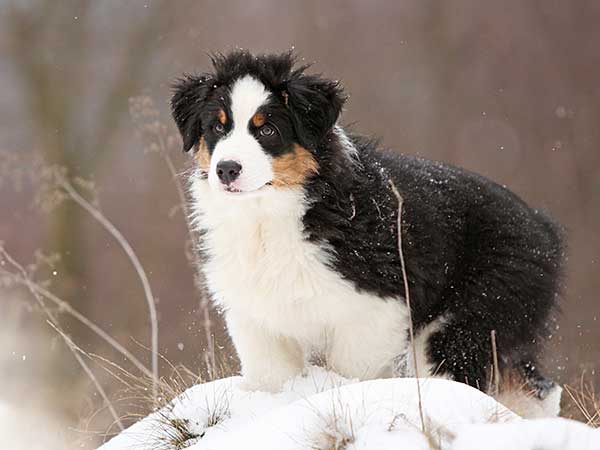
Does Seasonal Affective Disorder In Dogs Affect Australian Shepherds?
Seasonal affective disorder in dogs is a subject of much debate. Many Australian Shepherd owners may notice a change in their dog's behavior during the winter months when there is less sunlight and wonder whether it might be caused by SAD. While occurrences of SAD in humans have certainly been well documented, the evidence for it in dogs is less certain.
SAD is a type of depression that is brought on by a lack of sunlight and may cause a variety of symptoms including lack of energy, loss of appetite and feelings of sadness. Typically, these symptoms occur during the winter months and are relieved during the sunnier days of summer.
When it comes to the concept of SAD in dogs, it can be more difficult to make a precise diagnosis for the simple reason that they can't actually describe how they're feeling.

zuzule / stock.adobe.com
Behavior changes that occur in your Australian Shepherd during winter months may appear to be seasonal affective disorder, however, they could also be due to several other factors.
It may be possible to notice that a once active and energetic dog seems to lack some of his natural energy when he's suddenly forced to spend more time indoors during cold weather, but the exact cause of those symptoms is less certain. While it may be a case of seasonal affective disorder in dogs, it could simply be that your dog is picking up on your own change in behavior and mimicking it, as is often the case.
While there is no conclusive proof of SAD in dogs, there are certain physical issues that are known to affect dogs that are not exposed to enough sunlight. Primary among these is something called Light Responsive Alopecia, which is loss of hair that occurs when a dog doesn't get enough sun exposure.
This condition is more prominent in certain breeds including Schnauzers, Airedale Terriers, Doberman Pinschers and Bulldogs and tends to reverse itself when the dog gets enough sun.
Diagnosing Seasonal Affective Disorder In Dogs
While this condition has been properly documented, the evidence is much more tenuous in terms of diagnosing seasonal affective disorder in dogs. What we do know is that dogs are extremely sensitive to changes in the mood and demeanor of the humans around them so if you become depressed during the winter, your pup is likely to pick up on that.
The symptoms that you are identifying as depression in your dog could also simply be boredom, as most dogs don't get to go out and move around as much in the colder weather.
Seasonal Affective Disorder In Australian Shepherds
This can be a particular issue for active breeds like the Australian Shepherd that have a real need to burn off excess energy. Whether or not it is truly a manifestation of SAD in dogs, this can be easily counteracted by allowing plenty of sunlight into your house on a regular basis and making sure that you keep your pup engaged. This can be accomplished by either taking him outside for walks or play time or giving him toys and puzzle feeders to challenge him while he's indoors.
Remember that Australian Shepherds are naturally active and energetic and it is important that they have a way to expend that energy throughout the year, no matter the weather. It may be more of a challenge to get out and get moving in the cold winter months but it can be good for both you and your dog to get some air and activity in order to fight those "winter blues".
We simply don't know if seasonal affective disorder in dogs is a genuine issue, but that doesn't mean you can't help to keep your best friend active and engaged and help to improve his mood and yours in the process.
For more information about Aussie health issues see the Australian Shepherd Health & Genetics Institute (ASHGI).
Have Dog Training Questions?
Check out these introductory dog training videos...
I want my dog to stop being aggressive.
I want some help training my new puppy.
I want my dog to stop barking at everything.
Get Australian Shepherd Info, Website Updates, Special Offers, and Cartoons...
FREE GIFT
You'll also receive a free copy of the ebook
My Everyday Dog Training Tools
by professional dog trainer Daniel Abdelnoor, "Doggy Dan"










 Loading Image...
Loading Image...